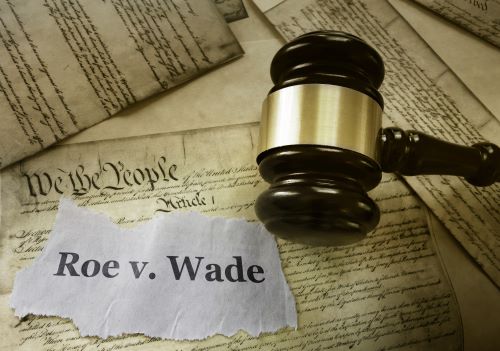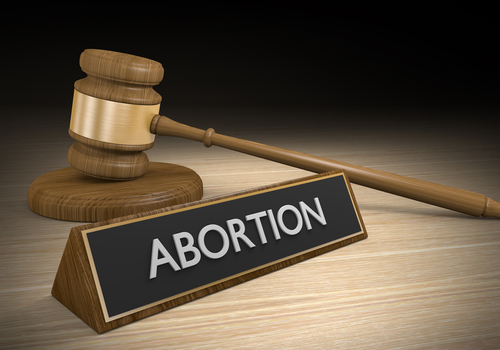Legal experts fear loss of abortion right could usher in end of same-sex marriage, other rights

Images from Shutterstock.
In the two days since Politico published a draft U.S. Supreme Court opinion that seems to strike down Roe v. Wade, several legal experts have expressed concerns that the same reasoning that eliminates the right to abortion could also put other constitutional rights at risk.
Conservative Justice Samuel Alito wrote in the 98-page draft opinion that the U.S. Constitution doesn’t reference abortion, and the right to abortion is also not implicitly protected by any of its provisions, including the due process clause of the 14th Amendment.
“That provision has been held to guarantee some rights that are not mentioned by the Constitution, but any such right must be ‘deeply rooted in this nation’s history and tradition’ and ‘implicit in the concept of ordered liberty,’” Alito said in the opinion for Dobbs v. Jackson Women’s Health Organization, a case that arose after Mississippi passed a law in 2018 that bans most abortions after 15 weeks of pregnancy. “The right to abortion does not fall within this category.”
Laurence H. Tribe, a constitutional law professor emeritus of at Harvard University, argued in an opinion article in the Boston Globe on Tuesday that not many people will forget where they were when they heard about the draft opinion overturning Roe, a landmark decision from 1973 that established a woman’s constitutional right to abortion.
“But there is more,” Tribe added. After reading the draft, “you quickly learn that all the rights people have long taken for granted—like the rights to decide whom to marry, whether to use birth control, with whom to have sex, how to raise your children, and an endless list of other freedoms—will no longer be protected unless you can point to language in the Constitution expressly guaranteeing those rights or convince five Supreme Court justices that they are ‘deeply rooted in this nation’s history and tradition’ and ‘implicit in the concept of ordered liberty.’”
Erwin Chemerinsky, dean of the University of California at Berkeley School of Law and an ABA Journal contributor, wrote in a Time article Tuesday that the legal implications of overturning Roe “will be enormous.” He also contended that following Alito’s reasoning means that many Supreme Court decisions protecting basic aspects of privacy and autonomy were wrong.
One of those is Griswold v. Connecticut, a 1965 case in which the Supreme Court ruled that the Constitution protected the right of marital privacy against state restrictions on contraception. Chemerinsky pointed out that this is similarly a right not mentioned in the Constitution, contemplated when the document was ratified or historically protected.
“I expect that after Roe is overruled, some states will quickly pass laws prohibiting types of contraceptives that act after conception, like the IUD and the morning-after pill,” Chemerinsky wrote. “Under Justice Alito’s reasoning, those laws too would be constitutional.”
 Related article from ABAJournal.com: “Chemerinsky: Ruling in abortion cases will greatly affect women’s lives but won’t end controversy”
Related article from ABAJournal.com: “Chemerinsky: Ruling in abortion cases will greatly affect women’s lives but won’t end controversy”
Chemerinsky and other experts, such as Neal K. Katyal, a professor at the Georgetown University Law Center who formerly served as acting U.S. solicitor general, have questioned whether the Supreme Court will now target the right to same-sex marriage. In its 5-4 decision in Obergefell v. Hodges in 2015, the Supreme Court held that same-sex couples’ fundamental right to marry is protected by the due process and equal protection clauses of the 14th Amendment.
“There is obviously no tradition of same-sex marriage per se, but Justice [Anthony] Kennedy’s brilliant opinion allowed the court to reach deeper into the American tradition of liberty to generalize about the rights and freedoms at stake,” Katyal wrote Tuesday in an article for the Washington Post. “The same move made in the draft opinion about abortion, however, can be used to overturn Obergefell.”
Jordan Woods, the faculty director of the LGBTQ Law & Policy Program at the University of Arkansas, said in another article Tuesday in the Washington Post Alito’s reasoning in the Dobbs opinion is similar to that in his Obergefell dissent. He agreed that opponents of same-sex marriage could possibly use Alito’s logic in attempts to overturn Obergefell.
“Ultimately, what the court will do, nobody knows,” said Woods, who added that Alito’s “draft absolutely provides a blueprint for the court essentially eroding or even overturning important constitutional precedents that are in this area of privacy that clearly this draft opinion is hostile towards.”
Other legal experts say it is unlikely that the Supreme Court will seek to terminate other constitutional rights.
Douglas NeJaime, a professor at Yale Law School with expertise in sexuality and constitutional law, pointed out to the Washington Post that Alito said the Dobbs ruling only applied to abortion, and that Roe was different than other issues weighed by the high court.
NeJaime said he thought that Alito’s “draft opinion is actually trying to say Obergefell is not a target.”
“The abortion right is also critically different from any other right that this court has held to fall within the 14th Amendment’s protection of ‘liberty,’” Alito wrote in the draft opinion. “Roe’s defenders characterize the abortion right as similar to the rights recognized in past decisions involving matters such as intimate sexual relations, contraception and marriage, but abortion is fundamentally different, as both Roe and Casey acknowledged, because it destroys what those decisions called ‘fetal life.’”
The Supreme Court affirmed in Planned Parenthood v. Casey in 1992 that the Constitution protects a woman’s right to have an abortion before a fetus becomes viable.
Politico reported that conservative Justices Clarence Thomas, Neil Gorsuch, Brett Kavanaugh and Amy Coney Barrett voted with Alito after the original hearing on Dobbs. Alito’s opinion will not be final until it is published, and justices in the past have changed their votes as draft opinions circulate through the high court.
The Supreme Court’s final opinion will likely be released within the next two months. ABA President Reginald Turner released a statement on Tuesday saying the ABA “has long supported the right to reproductive choice under existing Supreme Court precedents,” and adding, “It has become a right that affects women in every way—from economics to health to career choices and family life. Reversing this right would undermine the stability of the law gained through our adherence to precedents; it would jeopardize the public’s faith in our legal institutions; and it would have a devastating effect on the expectations—and the lives—of millions of women.”
Bloomberg Law, Courthouse News Service and Law360 have additional coverage of the potential impact of the Dobbs decision on other rights.
See also:
ABAJournal.com: “Alito’s leaked draft opinion shows Supreme Court is likely to strike down Roe v. Wade”
ABAJournal.com: “Rare but not unprecedented Supreme Court leak considered ‘staggering’”
ABAJournal.com: “What does the original Roe v. Wade really say?”
Updated on May 5 to add President Reginald Turner’s statement.
Write a letter to the editor, share a story tip or update, or report an error.


